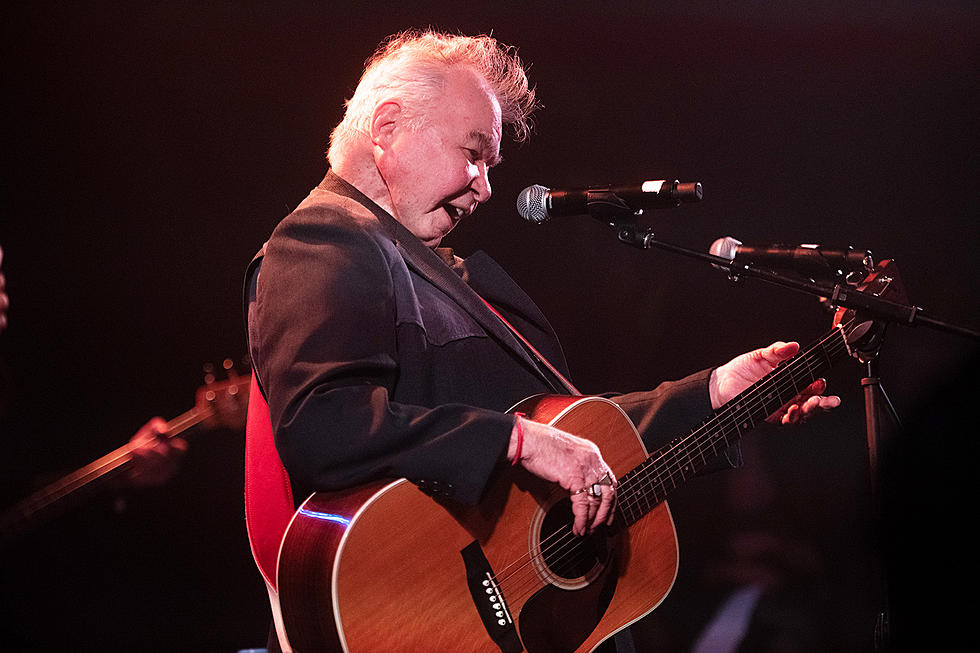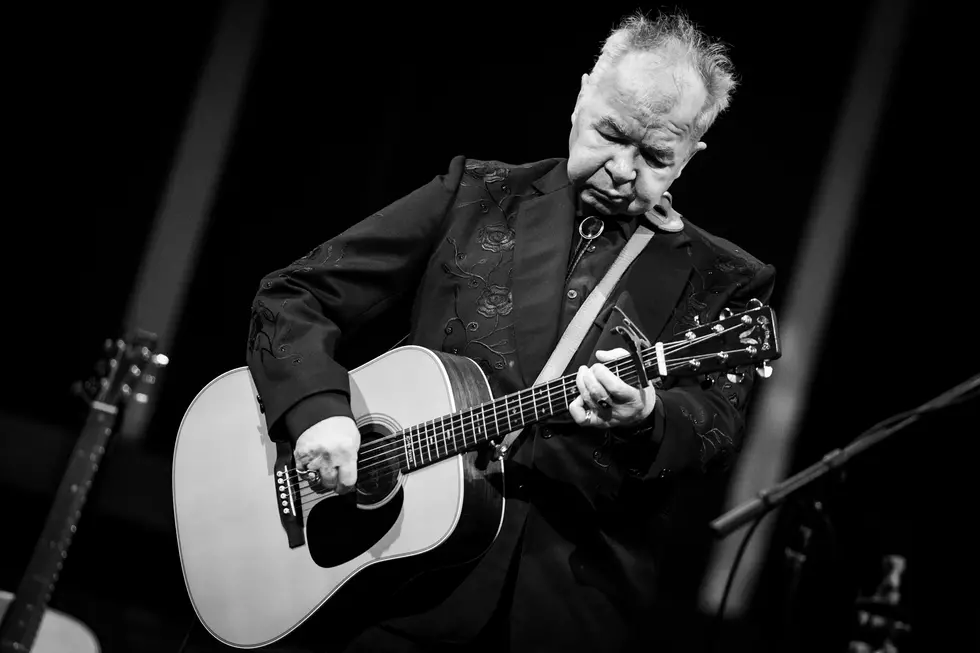
Top 10 John Prine Songs
Honestly, we wouldn't be out of place if we just picked 10 songs from John Prine's self-titled debut album for our list of the Top 10 John Prine Songs.
It's not that his career didn't yield anything as good as that 1971 LP; it's just that the album is that great. It's also an incredibly influential work that has inspired singer-songwriters for generations, many of whom have covered his work over and helped spread his legacy over the past five decades.
Prine was working as a mailman in Chicago when Kris Kristofferson, then at the peak of his own influence, heard him and helped get him a record deal. He quickly became a favorite of other singers, whose covers helped them eventually seal their own legends. Prine also inspired an entire generation of songwriters with his music, which can be both funny and sad within the span of a single four-minute song.
He released a dozen albums leading into the mid-'90s, including a comeback LP, 1991's The Missing Years, that ranks as one of his all-time best. Following a 1998 battle with cancer that left nerves in his tongue severed, and which altered the tone of his voice, Prine released In Spite of Ourselves, an album featuring mostly covers of old country songs as duets with female singing partners including Emmylou Harris and Lucinda Williams.
That sparked a new era of inspiration and fans, as a new wave of artists – from alt-country troubadours to plugged-in indie rockers – discovered their own voices in his mix of social commentary and portraits of Middle America. There's a wide range of hope, love and despair in his music, as you'll see in our below list of Top 10 John Prine Songs.
No. 10. "Speed of the Sound of Loneliness"
From: German Afternoons (1986)
Prine formed his own record company for his previous record in 1984. With German Afternoons, he had the freedom to dive even deeper into traditional country music, collaborating with bluegrass musicians and finding influence in the genre's past. "Speed of the Sound of Loneliness" is the album's highlight and a favorite of other artists, including Nanci Griffith, who recruited Prine for a duet of the song in 1993. His subtle original is the springboard.
No. 9. "Illegal Smile"
From: John Prine (1971)
The opening song on Prine's first album was quickly adapted as a pot-smoker's anthem. But that wasn't his intent. "It was more about how, ever since I was a child, I've had this view of the world where I would find myself smiling at stuff nobody else was smiling at," Prine writes in the excellent Great Days anthology. "But I didn't want to stop every time I played it and make a disclaimer." It's a light, loose beginning to a record that gets deeper and better as it progresses.
No. 8. "Sabu Visits the Twin Cities Alone"
From: Bruised Orange (1978)
Prine is sharpest as a songwriter when he peels off the protective layer around real life. "Sabu Visits the Twin Cities Alone" launches from the teen Indian actor who starred in movies like Elephant Boy and The Thief of Bagdad in the '30s and '40s, but pry deeper and the song turns into a rumination about Prine's life on the road. Prine didn't stray into this sort of territory too often in the early part of his career, but songs like this set him up for the '90s and later.
No. 7. "The Great Compromise"
From: Diamonds in the Rough (1972)
The follow-up to 1971's career-defining debut was thrown together quickly and cheaply, part of Prine's plan to get back to basics. "The Late John Garfield Blues" is also a keeper, but the more solemn "The Great Compromise" sums up Diamonds in the Rough, and Prine's take on the era, better. It's a protest song against the still-raging Vietnam War, but viewed through a patriotic lens filtered more by disappointment than animosity.
No. 6. "That's the Way That the World Goes 'Round"
From: Bruised Orange (1978)
Prine's strongest collection of songs since his debut seven years earlier found him looking more inward. Producer Steve Goodman (the singer-songwriter who wrote "City of New Orleans") was a kindred spirit, keeping the focus on Prine's words and bright sense of melody. "That's the Way That the World Goes 'Round" is both wizened and innocent, an optimist's take on looking at a life that's turned upside down. After a few wayward years, Prine rebounded with a smile.
No. 5. "Paradise"
From: John Prine (1971)
Prine's debut album is a textbook case on first records by singer-songwriters. John Prine shows his range, his humor, his ability to connect with listeners and his deft balancing of a lifetime's worth of songs just waiting for this moment. "Paradise" sounds like a country-music standard, covered in decades of dust. Prine weaves a cautionary environmental warning into a socioeconomic history lesson about a Kentucky coal-mining company.
No. 4. "Jesus the Missing Years"
From: The Missing Years (1991)
After a five-year absence, Prine returned with one of his best albums, co-produced by Tom Petty and the Heartbreakers bassist Howie Epstein. Prine won a Grammy for Best Contemporary Folk Album. Its centerpiece comes at the very end with the sprawling "Jesus the Missing Years," which details the 18 years of Christ's life that aren't documented in the Bible: "He cut his hair and moved to Rome / It was there he met his Irish bride." Prime Prine.
No. 3. "Angel From Montgomery"
From: John Prine (1971)
Loosely inspired by another song from his debut LP, "Hello in There," "Angel From Montgomery" again takes an outside perspective – this time of a middle-aged woman whose life long ago stalled out in an empty marriage and faded dreams. It soon became one of Prine's most-covered songs, with everyone from Bonnie Raitt to Dave Matthews Band taking turns over the years. It's heartbreaking, empathetic and a key moment in Prine's singer-songwriter legacy.
No. 2. "Hello in There"
From: John Prine (1971)
It's impossible to listen to "Hello in There" without getting a lump in your throat. At a time when young people were shunning their elders, Prine took an emotional turn in the other direction. "I've always had an affinity with old people," he notes in Great Days. There's never been a better song written about aging and the solitude of later years: "Old trees just grow stronger and old rivers grow wilder every day," he sings. "Old people just grow lonesome."
No. 1. "Sam Stone"
From: John Prine (1971)
"Sam Stone" is best known for its harrowing refrain: "There's a hole in Daddy's arm where all the money goes." But the entire song is a vivid portrait of a Vietnam War vet's downturn into drug addiction until his fatal overdose. Following the equally despairing "Hello in There" on Side One of Prine's debut, "Sam Stone" is a crushing gut punch that can leave you gasping for air. It's the start of Prine's legacy and the song where every other moment of truth and heartbreak comes from.
Top 100 '70s Rock Albums
More From Classic Rock Q107










